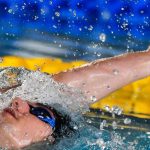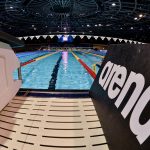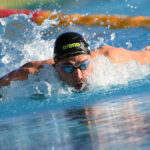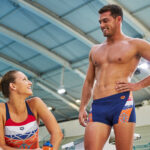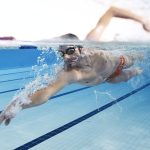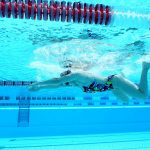Life is short, live it fast! Interview with Hannah Miley
Where do you do most of your training and in what length pool (25/50m)?
I used to do all of my training in a 25m pool, but just recently I have changed program and moved into the city where there is a brand new 50m pool. I now train predominantly long course with only 3 sessions short course.
What specific characteristics/qualities (both physical and technical) should a short course swimmer have compared to a long course one?
Short course swimmers characteristically will have better turns, fast round the walls and powerful and effective push offs. They should have a good ability to work on the technical aspects of short course swimming effectively like starts, turns, under water work and the ability to maintain speed into and out of the turns. Having a greater athletic ability i.e explosive power and athleticism is another quality good short course swimmers should have. Long course swimmers are better at maintaining speeds for a longer period of time, short course swimmers are great at changing direction and speed quickly and effectively.

With the 25m pool, technical aspects such as the turn, push, glide, and sprint naturally become more important – how do you work on these aspects in your preparation for a SC meet?
In preparation for racing at a SC meet I start the season working on plyometric work and athletic based land work to try and gain that athleticism and explosive power for starts and turns. In training, I focus on the technique of each aspect mentioned at slower speeds gradually building up to race pace speed once the ideal technique has been reached to reinforce it. Also hypoxic work is vital in training your lung capacity to cope with the demand of being under water more frequently in short course racing. You don’t want to suffer from too much oxygen debt during a race! I also put pressure on my ability to maintain good form and technique of those aspects mentioned during tough training sets, i.e. practicing technique under fatigue. It does help to train in a short course pool but you can still train effectively in a long course pool. Working on technique and increasing the volume of short speed work and hypoxic work will help.
How else does training for short course competition differ from long course? What is the main focus of training for short course competition in terms of programme, sets, etc.?
I was fortunate to have done most of my training at a short course pool so I never had a problem training for short course competitions. Recently though I have switched to a greater LC usage so I’m having to adapt my training to suit short course in a long course pool. I will work on training to hit race pace and fast speed work sets more frequently to try and accommodate the lack of short course training.
In an Olympic year, how difficult is the transformation (both physical and mental) from preparing for LC to SC?
It can be pretty tricky, a lot of swimmers will take a longer period of time off post Olympics so getting back into training in time for a short course event can be hard. Some may not feel fully ready to race when the short course competitions come round. Post Olympics to get your head back into training and get physically fit can take a bit longer as the impact the Olympics has is huge. To some swimmers short course racing is not as important as long course. I personally like racing short course, it’s an opportunity to race your opponents and I find you can have a lot more fun racing in a short course pool.
How do your race tactics differ between LC and SC? Would they differ for different events?
I find the tactics do differ for example 200m short course race feels like a 100m long course race, 400m race feels like a 200m long course race. You need to be sharp off the blocks and around the turns and not be afraid to be out fast where as long course if you are out too quick you can pay the price later on in the race as you train to maintain that speed over 50m, whereas short course you only need to hold it for 25m before you turn.

Do you motivate yourself differently for SC than for LC? How?
I keep my motivation the same, to me it’s all racing. Whether is in the little pool or the big pool I view both competitions as opportunities to race fast and pick up ways in improving my performance. To me, that’s my motivation!
Knowing that you’re heading into the Canadian winter, do you make any special preparation or take any specific items to help you in the freezing temperatures?
I’m bringing a nice warm jacket, hat and gloves and some heated garments……. And that’s just for poolside 😉 I like to stay warm!
